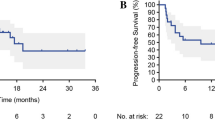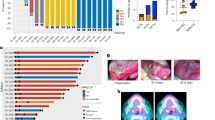Abstract
Considering that mycobacterial heat-shock protein 65 (hsp65) gene transfer can elicit a profound antitumoral effect, this study aimed to establish the safety, maximum-tolerated dose (MTD) and preliminary efficacy of DNA-hsp65 immunotherapy in patients with advanced head and neck squamous cell carcinoma (HNSCC). For this purpose, 21 patients with unresectable and recurrent HNSCC were studied. Each patient received three ultrasound-guided injections at 21-day intervals of: 150, 600 or 400 μg of DNA-hsp65. Toxicity was graded according to CTCAE directions. Tumor volume was measured before and after treatment using computed tomography scan. The evaluation included tumor mass variation, delayed-type hypersensitivity response and spontaneous peripheral blood mononuclear cell proliferation before and after treatment. The MTD was 400 μg per dose. DNA-hsp65 immunotherapy was well tolerated with moderate pain, edema and infections as the most frequent adverse effects. None of the patients showed clinical or laboratory alterations compatible with autoimmune reactions. Partial response was observed in 4 out of 14 patients who completed treatment, 2 of which are still alive more than 3 years after the completion of the trial. Therefore, DNA-hsp65 immunotherapy is a feasible and safe approach at the dose of 400 μg per injection in patients with HNSCC refractory to standard treatment. Further studies in a larger number of patients are needed to confirm the efficacy of this novel strategy.
This is a preview of subscription content, access via your institution
Access options
Subscribe to this journal
Receive 12 print issues and online access
$259.00 per year
only $21.58 per issue
Buy this article
- Purchase on Springer Link
- Instant access to full article PDF
Prices may be subject to local taxes which are calculated during checkout



Similar content being viewed by others
References
Vokes EE, Weichselbaum RR, Lippman SM, Hong WK . Head and neck cancer. N Engl J Med 1993; 328: 184–194.
Ku TK, Nguyen DC, Karaman M, Gill P, Hacia JG, Crowe GL . Loss of p53 expression correlates with metastatic phenotype and transcriptional profile in a new mouse model of head and neck cancer. Mol Cancer Res 2007; 5: 351–362.
Amar A, Franzi SA, Rapoport A . Evolution of patients with squamous cell carcinoma of upper aerodigestive tract. Sao Paulo Med J 2003; 121: 155–158.
Winquist E, Oliver T, Gilbert R . Postoperative chemoradiotherapy for advanced squamous cell carcinoma of the head and neck: a systematic review with meta-analysis. Head Neck 2007; 29: 38–46.
Siu LL, Soulieres D, Chen EX, Pond GR, Chin SF, Francis P et al. Phase I/II trial of erlotinib and cisplatin in patients with recurrent or metastatic squamous cell carcinoma of the head and neck: a Princess Margaret Hospital phase II consortium and National Cancer Institute of Canada Clinical Trials Group Study. J Clin Oncol 2007; 25: 2178–2183.
Sersa G, Miklavcic D, Cemazar M, Rudolf Z, Pucihar G, Snoj M . Electrochemotherapy in treatment of tumours. Eur J Surg Oncol 2007; 2: 232–240.
Robbins KT, Storniolo AM, Kerber C, Vicario D, Seagren S, Shea M et al. Phase I study of highly selective supradose cisplatin infusions for advanced head and neck cancer. J Clin Oncol 1994; 12: 2113–2120.
Whiteside TL, Letessier E, Hirabayashi H, Vitolo D, Bryant J, Barnes L et al. Evidence for local and systemic activation of immune cells by peritumoral injections of interleukin 2 in patients with advanced squamous cell carcinoma of the head and neck. Cancer Res 1993; 53: 5654–5662.
Shin DM, Glisson BS, Khuri FR, Clifford JL, Clayman G, Benner SE et al. Phase II and biologic study of interferon alfa, retinoic acid, and cisplatin in advanced squamous skin cancer. J Clin Oncol 2002; 20: 364–370.
Herold-Mende C, Karcher J, Dyckhoff G, Schirrmacher V . Antitumor immunization of head and neck squamous cell carcinoma patients with a virus-modified autologous tumor cell vaccine. Adv Otorhinolaryngol 2005; 62: 173–183.
Nemunaitis J, Khuri F, Ganly I, Arseneau J, Posner M, Vokes E et al. Phase II trial of intratumoral administration of ONYX-015, a replication-selective adenovirus, in patients with refractory head and neck cancer. J Clin Oncol 2001; 19: 289–298.
Castelli C, Rivoltini L, Rini F, Belli F, Testori A, Maio M et al. Heat shock proteins: biological functions and clinical application as personalized vaccines for human cancer. Cancer Immunol Immunother 2004; 53: 227–233.
Binder RJ . Heat shock protein vaccines: from bench to bedside. Int Rev Immunol 2006; 25: 353–375.
Prohaszka Z . Chaperones as part of immune networks. Adv Exp Med Biol 2007; 594: 159–166.
Menoret A, Peng P, Srivastava PK . Association of peptides with heat shock protein gp96 occurs in vivo and not after cell lysis. Biochem Biophys Res Commun 1999; 262: 813–818.
Paz P, Brouwenstijn N, Perry R, Shastri N . Discrete proteolytic intermediates in the MHC class I antigen processing pathway and MHC I-dependent peptide trimming in the ER. Immunity 1999; 11: 241–251.
Kunisawa J, Shastri N . The group II chaperonin TRiC protects proteolytic intermediates from degradation in the MHC class I antigen processing pathway. Mol Cell 2003; 12: 565–576.
Portaro FC, Hayashi MA, De Arauz LJ, Palma MS, Assakura MT, Silva CL et al. The Mycobacterium leprae hsp65 displays proteolytic activity. Mutagenesis studies indicate that the M.leprae hsp65 proteolytic activity is catalytically related to the HslVU protease. Biochemistry 2002; 41: 7400–7406.
Srivastava P . Roles of heat-shock proteins in innate and adaptive immunity. Nat Rev Immunol 2002; 2: 185–194.
Binder RJ, Srivastava PK . Peptides chaperoned by heat-shock proteins are a necessary and sufficient source of antigen in the cross-priming of CD8+ T cells. Nat Immunol 2005; 6: 593–599.
Segal BH, Wang XY, Dennis CG, Youn R, Repasky EA, Manjili MH et al. Heat shock proteins as vaccine adjuvants in infections and cancer. Drug Discov Today 2006; 11: 534–540.
Chen X, Tao Q, Yu H, Zhang L, Kao X . Tumor cell membrane-bound heat shock protein 70 elicits antitumor immunity. Immunol Lett 2002; 84: 81–87.
Michaelsson J, Teixeira de Matos C, Achour A, Lanier LL, Kärre K, Söderström K . A signal peptide derived from hsp60 binds HLA-E and interferes with CD94/NKG2A recognition. J Exp Med 2002; 196: 1403–1414.
Lowrie DB, Silva CL, Colston MJ, Ragno S, Tascon RE . Protection against tuberculosis by a plasmid DNA vaccine. Vaccine 1997; 15: 834–838.
Lowrie DB, Tascon RE, Bonato VL, Lima VM, Faccioli LH, Stavropoulos E et al. Therapy of tuberculosis in mice by DNA vaccination. Nature 1999; 400: 269–271.
Bonato VL, Goncalves ED, Soares EG, Santos Júnior RR, Sartori A, Coelho-Castelo AA et al. Immune regulatory effect of pHSP65 DNA therapy in pulmonary tuberculosis: activation of CD8+ cells, interferon-gamma recovery and reduction of lung injury. Immunology 2004; 113: 130–138.
Silva CL, Bonato VL, Coelho-Castelo AA, De Souza AO, Santos SA, Lima KM et al. Immunotherapy with plasmid DNA encoding mycobacterial hsp65 in association with chemotherapy is a more rapid and efficient form of treatment for tuberculosis in mice. Gene Therapy 2005; 12: 281–287.
Lukacs KV, Lowrie DB, Stokes RW, Colston MJ . Tumor cells transfected with a bacterial heat-shock gene lose tumorigenicity and induce protection against tumors. J Exp Med 1993; 178: 343–348.
Yi H, Rong Y, Yankai Z, Wentao L, Hongxia Z, Jie W et al. Improved efficacy of DNA vaccination against breast cancer by boosting with the repeat beta-hCG C-terminal peptide carried by mycobacterial heat-shock protein HSP65. Vaccine 2006; 24: 2575–2584.
Nuermberger E, Tyagi S, Williams KN, Rosenthal I, Bishai WR, Grosset JH . Rifapentine, moxifloxacin, or DNA vaccine improves treatment of latent tuberculosis in a mouse model. Am J Respir Crit Care Med 2005; 172: 1452–1456.
Tuomela M, Stanescu I, Krohn K . Validation overview of bio-analytical methods. Gene Therapy 2005; 12 (Suppl 1): S131–S138.
Therasse P, Arbuck SG, Eisenhauer EA, Wanders J, Kaplan RS, Rubinstein L et al. New guidelines to evaluate the response to treatment in solid tumors. European Organization for Research and Treatment of Cancer, National Cancer Institute of the United States, National Cancer Institute of Canada. J Natl Cancer Inst 2000; 92: 205–216.
Todryk SM, Melcher AA, Dalgleish AG, Vile RG . Heat shock proteins refine the danger theory. Immunology 2000; 99: 334–337.
Lima KM, dos Santos SA, Santos RR, Brandão IT, Rodrigues Jr JM, Silva CL . Efficacy of DNA-hsp65 vaccination for tuberculosis varies with method of DNA introduction in vivo. Vaccine 2003; 22: 49–56.
Lowrie DB . DNA vaccines for therapy of tuberculosis: where are we now? Vaccine 2006; 24: 1983–1989.
Kaufmann SH, Vath U, Thole JE, Van Embden JD, Emmrich F . Enumeration of T cells reactive with Mycobacterium tuberculosis organisms and specific for the recombinant mycobacterial 64-kDa protein. Eur J Immunol 1987; 17: 351–357.
Cross D, Burmester JK . Gene therapy for cancer treatment: past, present and future. Clin Med Res 2006; 4: 218–227.
Vattemi E, Claudio PP . Adenoviral gene therapy in head and neck cancer. Drug News Perspect 2006; 19: 329–337.
Mincheff M, Tchakarov S, Zoubak S, Loukinov D, Botev C, Altankova I et al. Naked DNA and adenoviral immunizations for immunotherapy of prostate cancer: a phase I/II clinical trial. Eur Urol 2000; 38: 208–217.
Victora G, Socorro-Silva A, Volsi E, Abdallah K, Lima F, Michaluart P et al. Immune response to vaccination with DNA-hsp65 in head and neck cancer patients. Submitted.
Acknowledgements
We would like to thank Roger Chammas for his useful advice during the planning of the trial, Dr José Maciel Rodrigues Jr and Dr Karla Lima for their help in vaccine production. This work was supported by grants from CNPq (Conselho Nacional de Desenvolvimento Científico e Tecnológico) and FINEP (Financiadora de Estudos e Projetos).
Author information
Authors and Affiliations
Corresponding author
Additional information
Author contributions
Conception and design: Celio L Silva, Pedro Michaluart, Kald Abdallah, Verônica Coelho.
Administrative support: Celio L Silva and Pedro Michaluart.
Provision of study materials or patients: Celio L Silva, Pedro Michaluart, Kald Abdallah, Raquel A Moysés, Fanny D Lima, Rodney B Smith and Maria Cristina Chammas.
Collection and assembly of data: Pedro Michaluart, Kald Abdallah, Fanny D Lima, Rodney B Smith, Raquel A Moysés, Verônica Coelho, Gabriel D Victora, Jorge Kalil, Alberto R Ferraz, Ana K Barreto, Maria Cristina Chammas, Regina LE Gomes, Eloisa Gebrim, Lica Arakawa-Sugueno, Kariane P Fernandes, Paulo A Lotufo and Maria Regina Cardoso.
Data analysis and interpretation: Pedro Michaluart, Kald Abdallah, Fanny D Lima, Rodney B Smith, Raquel A Moysés, Verônica Coelho, Gabriel D Victora, Adalberto Socorro-Silva, Evelyn C Volsi, Jorge Kalil, Carlos R Zárate-Bladés, Alberto R Ferraz, Ana K Barreto, Regina LE Gomes, Eloisa Gebrim, Lica Arakawa-Sugueno, Kariane P Fernandes, Paulo A Lotufo, Maria Regina Cardoso and Celio L Silva.
Manuscript writing: Celio L Silva, Pedro Michaluart, Verônica Coelho, Carlos R Zárate-Bladés, Gabriel D Victora, Fanny D Lima, Rodney B Smith and Maria Regina Cardoso.
Finnal approval of manuscript: Pedro Michaluart, Kald Abdallah, Fanny D Lima, Rodney B Smith, Raquel A Moysés, Verônica Coelho, Gabriel D Victora, Adalberto Socorro-Silva, Evelyn C Volsi, Jorge Kalil, Carlos R Zárate-Bladés, Alberto R Ferraz, Ana K Barreto, Maria Cristina Chammas, Regina LE Gomes, Eloisa Gebrim, Lica Arakawa-Sugueno, Kariane P Fernandes, Paulo A Lotufo, Maria Regina Cardoso and Celio L Silva.
Rights and permissions
About this article
Cite this article
Michaluart, P., Abdallah, K., Lima, F. et al. Phase I trial of DNA-hsp65 immunotherapy for advanced squamous cell carcinoma of the head and neck. Cancer Gene Ther 15, 676–684 (2008). https://doi.org/10.1038/cgt.2008.35
Received:
Accepted:
Published:
Issue Date:
DOI: https://doi.org/10.1038/cgt.2008.35
Keywords
This article is cited by
-
New strategy for testing efficacy of immunotherapeutic compounds for diabetes in vitro
BMC Biotechnology (2016)
-
Nucleic acid targeting: towards personalized therapy for head and neck cancer
Oncogene (2016)
-
Combined immunization using DNA-Sm14 and DNA-Hsp65 increases CD8+ memory T cells, reduces chronic pathology and decreases egg viability during Schistosoma mansoniinfection
BMC Infectious Diseases (2014)
-
Expression of Mycobacterium leprae HSP65 in tobacco and its effectiveness as an oral treatment in adjuvant-induced arthritis
Transgenic Research (2011)
-
Immune response to vaccination with DNA-hsp65 in a phase I clinical trial with head and neck cancer patients
Cancer Gene Therapy (2009)



